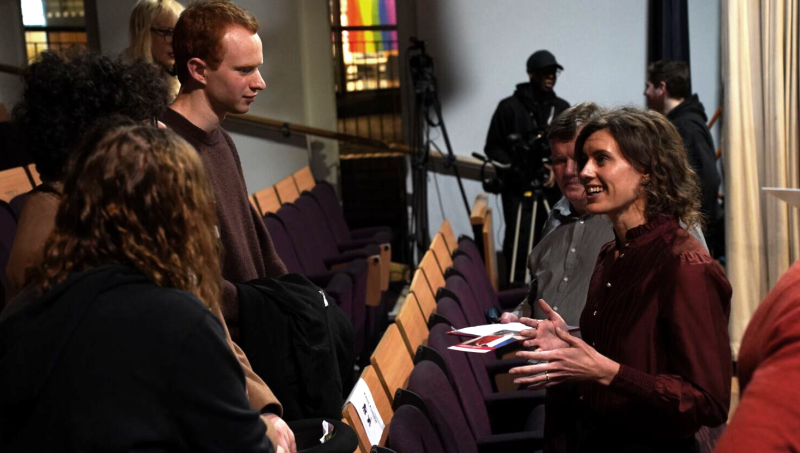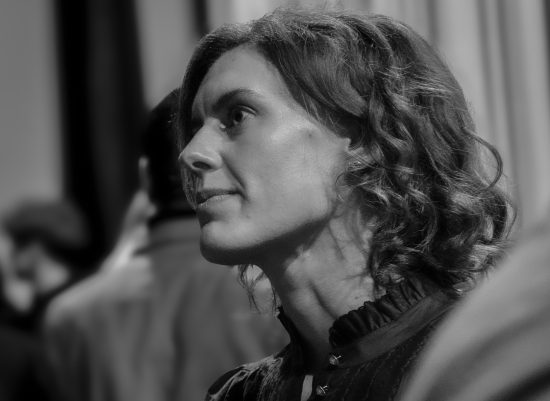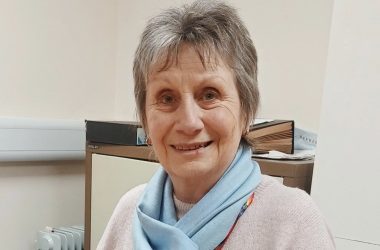Jessica Toale, 37, is the Labour Party’s candidate for Bournemouth West, where she takes on Sir Conor Burns of the Conservatives, who has held the seat since May 2010. Toale’s campaign prioritises revitalising the town centre, supporting arts, addressing sewage pollution, and tackling knife crime.
A serving Labour councillor in the City of Westminster, Toale holds an MSc in Urbanisation and Development from the London School of Economics. She is an international development and foreign policy consultant, and has served as political advisor to two shadow secretaries of state for international development.
For this edition of the Breaker, which focusses on electoral politics in Bournemouth, Christchurch and Poole (BCP), we spoke to Toale on a range of issues related to the upcoming general election. Excerpts from the interview1, which has been edited for clarity and brevity.
Until March 2023, women made up just 31 per cent of parliamentarians. As a female candidate in a traditionally male-dominated field, how do you feel about the role? Are there any challenges you encounter?
The number of women in Parliament are not as good as we would like them to be, but they have been improving.We have to remember that about 100 years ago, women didn’t even have vote in this country and many countries around the world. So I actually feel very lucky that I am benefiting from the hard work that women who’ve came before me have done. It’s important to have women’s voices on all issues, not just women’s issues. You have seen the nature of the debate, the issues that are raised in
It is important to have women’s issues on all issues, not just women’s issues
Parliament become much more diverse, much more relevant to everyday working families. It’s also changed our view on what good leadership can look like. Having women and much more diverse candidates as MPs means that you have much more robust debate. You’re actually hearing the views and life experiences of all types of people. I’m excited to stand in Bournemouth because not only has there never been a Labour MP in Bournemouth, there’s never been a woman MP in Bournemouth. So we have a real chance to make history here in the next election. Personally, I’m not particularly daunted about it being a male-dominated industry.
The Labour Party has a high percentage of female candidates. Do you see this as an advantage?
I wouldn’t necessarily say I see it as an advantage. Perhaps in Bournemouth now, it’s a slight advantage to me because what we’re trying to present to the electorate at the moment is that it’s time for change. We hear it on the doorstep a lot. People really feel that after 14 years of a Conservative government that they want to try something different. And the sitting MP in Bournemouth West has been the MP for the last 14 years, exactly the same time as the current government. I present an option for people which is completely different from him. I’m a young woman. I have a a historic connection to the area. I bring energy, I bring ideas, and I help represent the Labour Party to people who may never have considered voting Labour before.

According to a report from 2023, the number of homeless people in Bournemouth, Christchurch and Poole has increased by 26 per cent. What would you do to bring these numbers down?
Across the country, we’ve seen a steady increase in levels of homelessness. Firstly, because of a decade of austerity politics a lot of essential services have been cut back. It’s not an easy issue to solve, but what we would like to see is a workable housing strategy, so that people can access support before they end up on the streets, and [they] have genuine places to go. We’d really like to see meaningful routes for people out of rough sleeping, and look at bringing in supported housing.
The other issue is how do we plug the gap in provision for people who, say, are leaving prison, or are leaving the care system. We’re looking at all of these issues to make sure that before you’re homeless, there’s a housing provision. One of Labour’s missions is to build 1.5 million homes. To ensure that a substantial proportion of these are affordable homes, one of the things that we’ve been pushing is to abolish Section 21, which is the no-fault eviction clause in leases. There’s a lot of opportunities here, but it comes down to the affordability and availability of housing at its roots, and then getting the wraparound services that are needed if you’re experiencing homelessness.
Do you have any specific measures for refugees? What will your policy be?
It is again another complex issue, isn’t it? Because the government has totally failed in its responsibilities. To process asylum seeker claims, we’ve seen a massive increase in the use of hotels. This is something that impacts Bournemouth. They [the government] haven’t also thought through some of the legal schemes that they’ve put in place. Homes for Ukraine was a really great programme, but it all of a sudden ended without support for the families who were housing refugees, but also for the refugees themselves.
There was another issue a few months ago in Bournemouth. Families of Afghans who had come at the invitation of the British government were all of a sudden being evicted from their houses because the council weren’t able to find replacement homes in the private rental sector. So there’s one bit where legal schemes are ending and refugees are trying to find homes. I think, again, that goes back to this need to build more homes and to make the rental market more affordable.
The government has cut thousands of case workers from the Home Office. We need to rehire and train those case workers to ensure that people’s asylum claims are being adjudicated in a timely manner, so people aren’t waiting in limbo for two years to hear about their case. We would like to see within 12 months of a Labour government the use of hotels ended. We’d like to see that people whose cases are genuine can stay in the UK, and are able get to work, to build their lives again. But also, [we would like to see] people who aren’t allowed to stay are returned as fast as they can be, and they’re not being put up in hotels in different places around the country.

We spoke to homeless people before this interview. Many said they feel asylum seekers are being prioritised over UK citizens. How would you respond to this?
There’s definitely that feeling. I talk to people all the time who say they feel like new arrivals to the country are being prioritised over, say, veterans who are ending up homeless, or families who are losing their homes for various reasons. I really don’t want to pit one community against another; it’s one of the worst things you can do. Ultimately what has happened is there’s been under funding in our social services and in our house building for more than a decade. That’s what’s causing this rift between communities. And that’s what’s leading to people who have served our country or families with children ending up in temporary accommodation, or on the streets. I think if we can get the house building right, if we can get the investment in the public services that we need, then we’ll start to see amending of this real anger and real injustice that there is in the country at the moment.
It’s not refugees or asylum seekers taking services or housing away from British people, it’s that the provision is not good enough in the first place
When people feel that the economy is not doing so well, or that they’re not getting the right support that they need, they look for somebody to blame. Unfortunately, at the moment that appears to be refugees or asylum seekers in the UK. I don’t think that attitude is good for anybody because it’s not refugees or asylum seekers taking services or housing away from British people. It’s that the provision is not good enough in the first place.
What is your plan for international students who are impacted by the lack of student housing and facing high rental prices in Bournemouth?
We would like to attract and continue to attract international students to the UK. We think it’s really important to nurture talent and skills. We want some of the best and brightest people to come to the UK, to build a relationship with the UK, and fulfil their own aspirations and dreams and goals.
The question you’ve asked is actually relevant to all students in Bournemouth, because Bournemouth is a place that has relatively, well, actually disproportionately high rent to the type of income that people can command in the town. So there’s a big disparity and it means that if you’re coming from outside of the UK, or you’re coming from another part of the UK, it’s very, very difficult to stay in Bournemouth afterwards. Which I think is a travesty because the two universities we have attract amazing talent and amazing skills and amazing energy. The people who are coming to Bournemouth, I would like them to stay in Bournemouth after they graduate, to contribute to the local economy and the local communities.
More than a third of children are in poverty in Bournemouth2. How would you help improve the lives of Bournemouth residents living under poverty? How would you prioritise children?
We’re seeing people like nurses and teachers having to use food banks because they’re really struggling at the moment. If you’re looking at each of those things individually, there are different interventions you can make. So on energy bills, what we’d like to see is reform of the retail energy market, so that we don’t see energy companies going bust, and people being put onto tariffs that they didn’t choose or they can’t afford.
The second is in Britain we have some of the leakiest homes in Europe. They’re very badly insulated. So we want to introduce a warm homes plan to get millions of homes across the country insulated, but also support energy efficiency measures in homes. We think that can bring bills down by quite a significant amount for families.
We want to see fair pay agreements in the care sector. And to strengthen protections and rights for people at work, particularly if you’re a working mother or you’re self-employed. And we’d like to see apprenticeships supported throughout the sector for people who haven’t necessarily gone to university, but might want to try a different route into work and be well paid for that as well.
We want to ensure that in primary schools, there’s free breakfast clubs for every school child. It will relieve the burden on parents. But we also think it’s good for community building and social cohesion within schools. We also want to see youth clubs brought back. That is a massive thing for me when you’re talking about slightly older children. And making sure that they have access to good role models, good activities, but also to mental health support in the community and in their schools so that, you know, we’re just trying to build healthier, more vibrant societies.
Teachers are having to work unpaid overtime in some schools in Bournemouth, and some teachers said there is not enough funding to support additional needs children, particularly in mainstream schools. What’s your perspective on this situation?
I think that this is really important to look at. We’ve been quite careful to put out fully funded plans for this, which includes the breakfast clubs in schools, reform to the curriculum, increasing mental health support within schools, and things like supervised toothbrushing for three- to five-year-olds. And tackling absenteeism is something that we’ve talked about more recently, but we also want to ensure that teaching is a great job for people to do.
We have made commitments to hiring 6,500 more teachers and making sure that they get the proper training and support that they need to help our kids in state schools thrive. And we want to ensure that the standards are really high, the service is really high. We want to make our schools great places again for kids because they really have the foundation for the rest of their lives.
How important is the impact of young people in shaping the outcome of the upcoming election? Do you have any strategies to make them more engaged?
It’s so important that young people are engaged, not only in politics, but the political process and our democratic process. I saw this really wonderful meme the other day, which was a picture of a room of people over the age of 65. It said, ‘Young people, if you don’t vote, these people will decide your future’. And that’s why it’s so important, because the decisions that are being made now are the ones that will impact your lives 10, 20 years in the future.
I have made a commitment to being an active, approachable MP with no second jobs, focused on the community
I understand that traditional party politics can be kind of boring. It can seem irrelevant to everyday life, but the decisions being made on a daily basis are really important, and I think young people are really political and engaged. They’re just engaged in a slightly different way. As a voting group, you really have the power to shift the dial here. There’s almost 20,000 students [in the Bournemouth area]. If you look at the last election results, the guy who won only won with 24,000 votes. So if you think about the power that students have in this next election, it’s immense.
According to the president of the Country Land and Business Association (CLA), the rural voters seem to be politically homeless. So if you become an MP, what measures would you propose to support rural life, and how would you get the support of rural voters?
This is an interesting question for me because Bournemouth West is a sort of urban-suburban constituency. There aren’t actually any farms. So I admit that I don’t spend a lot of time thinking about this particular subject. The environment more generally and food security are issues that I’m very interested in now.
There are two big issues I think for our farming and rural communities that I’d like to highlight. The first is that Brexit has been really bad for farming communities, and partly because of their ability to export, partly because of the subsidies that they would have received from the EU, but also because the government has been doing things which have completely neglected the farming and fishery industries. For instance, the trade deal with Australia was really bad for our beef and lamb farmers, and there didn’t seem to be very much engagement with the community around that. So we would like to see barriers removed.
As someone who switches between London and Bournemouth, how do you think you can maintain a strong tie with the local community to fulfil your duties?
As you might know, most MPs spend Monday to Thursday in Parliament because there are votes and work to do with committees etcetera, and they tend to come back to their constituencies either Thursday night or Friday and stay through the weekend. So that’s a pretty common thing for MPs to do. I have made a commitment to being an active, approachable MP with no second jobs, focused on the community. And I really see it as my role to be a convening power, to work with people and help people to solve problems.
What I would do is have regular public surgeries, so people can bring their challenges and problems to me directly. That doesn’t happen in Bournemouth at the moment. I will be an active and engaged member of community groups, spend time visiting schools and local GPs and local businesses and community groups. I want to be a critical friend, but also constructive partner to the Council, who, you know, has a lot of power in the local area to say ‘yes’ or ‘no’ to things. So I would spend, like most MPs, the latter half of my week in the constituency with my sleeves rolled up, getting involved, and making sure that people can come to me whenever they need.
You mentioned many plans to address issues. How would you make sure that these plans are actually put into action?
It depends what you’re talking about, right? Some of the issues that I’ve been campaigning on at the moment are getting the town centre back up and running again. And so some of that is working with the Council locally, to support local businesses, to support creative endeavours. But a lot of it is a national plan for the high streets and to support local businesses. The second issue is sewage dumping in the sea. It is a big issue that I’ve been working on, and what we’d like to see is legislation go through in the House of Commons, which would hold water bodies to account, introduce fines for sewage dumping, and ensure that the infrastructure is built properly and upgraded properly. So that requires me to be in the House of Commons to vote, and to raise those issues, in Parliament, on the House of Commons benches, to tell the stories of how it’s affecting the people in Bournemouth. The same goes for issues around social care, knife crime, antisocial behaviour. So it’s a combination of being in London and the House of Commons to vote for laws that will really make a difference, and being in Bournemouth — a visible presence, working with the communities to understand how we can do the bottom up work.
ALSO READ
Pitch Perfect
If politics were a cappella, they performed like the Barden Bellas. Multimodal essay on a political debate
Footnotes
- The Breaker had also approached the Conservative candidates in Bournemouth for an interview. Our requests were not responded to till publication time. ↩︎
- From a study by End Child Poverty: http://www.endchildpoverty.org.uk/wp-content/uploads/2019/05/Regional-Estimates-LAD-South-West-with-summary.xlsx ↩︎








